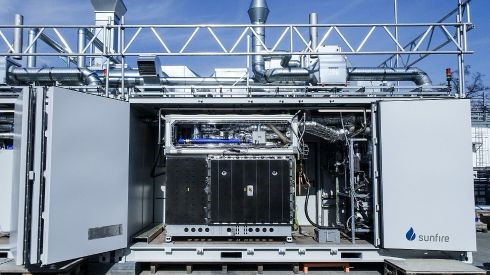News
Sunfire successfully completes test on electrolysis module

Sunfire successfully operated and tested a 250 kW-(0.25 MW) electrolysis module, which is setting the base for the planned distribution of a 3-MW electrolyzer to Neste’s refinery in Rotterdam in the scope of the EU-funded MultiPLHY project.
The solid oxide electrolysis cells (SOEC) module consists of 60 stacks with 1,800 SOECs. It produces 63 Nm²/h of hydrogen from renewable electricity and water steam – this is equivalent to a hydrogen production volume of 5.7 kg per hour. Due to the utilization of steam, high-temperature electrolysis is particularly efficient compared to other electrolysis technologies, reaching a conversion efficiency of 84%LHV to AC. The power consumption of Sunfire's SOEC module amounts to less than 40 kWhAC/kgH2. In total, the “Generation 2” high-temperature electrolyzer of Sunfire will consist of twelve SOEC modules, adding up to a 3 MW system. Sunfire’s previous "Generation 1" module consisted of 36 stacks and reached a capacity of 137 kW.
“The cells in Sunfire's newest SOEC module are connected in series to minimize costs for power electronics. With the successful commissioning of the first module – the heart of every SOEC system – we have achieved a key milestone in the industrialization of SOEC electrolyzers," says Oliver Posdziech, Head of Large Systems Development at Sunfire.
The optimized SOEC module is designed for industrial manufacturing and will be the core of Sunfire’s multi-megawatt electrolyzer that will be implemented in the pioneering project MultiPLHY. In this project, consortium partners CEA, Neste, Paul Wurth, ENGIE and Sunfire aim at generating green hydrogen for the production of high-quality biofuels at Neste's refinery in Rotterdam, setting the path for the decarbonization of the oil and gas industry. Launched in spring 2020, the project is part of the EU-funded Horizon 2020 FCH2-JU program and receives 6.9 MM EUR funding.
This project has received funding from the Fuel Cells and Hydrogen 2 Joint Undertaking (JU) under grant agreement No 101007108. The JU receives support from the European Union’s Horizon 2020 research and innovation program, Hydrogen Europe and Hydrogen Europe Research.

